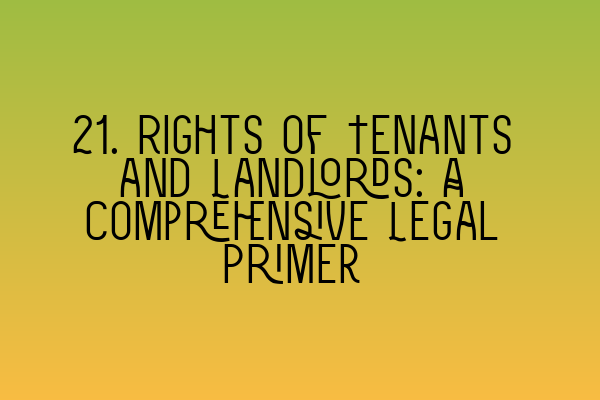21. Rights of Tenants and Landlords: A Comprehensive Legal Primer
Welcome to SQE Property Law & Land Law, your trusted source for all things related to property law in the UK. Today, we will be diving deep into the rights of tenants and landlords, providing you with a comprehensive legal primer on this topic.
Whether you are a tenant looking to understand your rights and responsibilities or a landlord seeking clarity on your legal obligations, this article is for you. We will cover a wide range of important topics, including tenancy agreements, eviction procedures, deposit protection, and much more.
Tenancy Agreements
One of the first and most crucial aspects of the tenant-landlord relationship is the tenancy agreement. This legal contract outlines the rights and obligations of both parties throughout the duration of the tenancy. It is essential for both tenants and landlords to fully understand the contents of the tenancy agreement before signing.
If you are a tenant, make sure you carefully read and comprehend all the terms and conditions specified in the tenancy agreement. Familiarize yourself with the length of the tenancy, monthly rent, responsibilities for repairs and maintenance, and any additional clauses that may affect your rights.
Landlords, on the other hand, must ensure that the tenancy agreement complies with all relevant laws and regulations. This includes providing the necessary information, such as the Energy Performance Certificate (EPC) and gas safety certificate.
For detailed information on drafting and understanding tenancy agreements, you may find SQE 1 Practice Mocks FLK1 FLK2 and SQE 1 Preparation Courses helpful.
Eviction Procedures
In certain situations, landlords may need to evict tenants due to non-payment of rent, breach of tenancy agreement, or other valid reasons. However, it is vital to follow the proper eviction procedures outlined in the law to avoid any legal repercussions.
The two primary methods of eviction in the UK are Section 8 and Section 21 notices. Section 8 notices are used when a tenant has breached the terms of the tenancy agreement, while Section 21 notices are utilized for no-fault evictions.
If you are a landlord planning to evict a tenant, it is crucial to adhere to the specific notice periods and procedures outlined in the law. Otherwise, your attempt to evict the tenant may be deemed invalid.
Tenants, on the other hand, must be aware of their rights and know when a landlord’s eviction notice is valid or invalid. Seeking legal advice when faced with an eviction notice can help protect your rights as a tenant.
To learn more about eviction procedures and the intricacies of landlord-tenant disputes, we recommend exploring our related article on SQE 2 Preparation Courses.
Deposit Protection
Protecting a tenant’s deposit is a legal requirement in the UK. Landlords are obligated to safeguard tenants’ deposits in a government-approved tenancy deposit scheme within 30 days of receiving the payment.
Tenants should ensure that their deposit is properly protected and that they receive the relevant prescribed information from their landlord within the specified timeframe. This information includes details about the scheme in which their deposit is protected, as well as other essential information to support a smooth tenancy.
If there are disputes regarding the return of the deposit at the end of the tenancy, both landlords and tenants have recourse to alternative dispute resolution (ADR) services provided by the deposit protection schemes. These services aim to resolve disagreements without resorting to costly and time-consuming court proceedings.
To stay updated with the latest deposit protection regulations and guidelines, make sure to regularly check the SRA SQE Exam Dates article on our website.
Conclusion
In summary, understanding the rights of tenants and landlords is essential for maintaining a harmonious and legally compliant tenancy. Tenancy agreements, eviction procedures, and deposit protection are just a few aspects that tenants and landlords must be familiar with.
If you require further guidance or legal advice regarding any property law matters, do not hesitate to reach out to SQE Property Law & Land Law. Our team of legal professionals is dedicated to providing expert assistance and ensuring that your rights are protected.
For additional resources and practice exercises to further your understanding of property law, we recommend exploring our SQE 1 Practice Exam Questions. These resources will help you reinforce your knowledge in preparation for the SQE exams.
Thank you for choosing SQE Property Law & Land Law as your go-to destination for reliable property law information. We hope this comprehensive legal primer has provided valuable insights into the rights and responsibilities of tenants and landlords.
